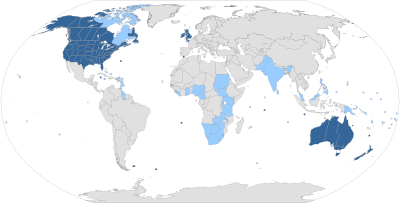
Back العالم الناطق بالإنجليزية Arabic Anglofonía AST Anqlofonlar Azerbaijani Англафоны Byelorussian ইংরেজিভাষী জগৎ Bengali/Bangla Anglofonia Catalan Anglalingvio Esperanto Anglofonía Spanish جهان انگلیسیزبان Persian Anglofonía Galician

The English-speaking world comprises the 88 countries and territories in which English is an official, administrative, or cultural language. In the early 2000s, between one and two billion people spoke English,[1][2] making it the largest language by number of speakers, the third largest language by number of native speakers and the most widespread language geographically. The countries in which English is the native language of most people are sometimes termed the Anglosphere. Speakers of English are called Anglophones.
Early Medieval England was the birthplace of the English language; the modern form of the language has been spread around the world since the 17th century, first by the worldwide influence of England and later the United Kingdom, and then by that of the United States. Through all types of printed and electronic media of these countries, English has become the leading language of international discourse and the lingua franca in many regions and professional fields, such as science, navigation and law.[3]
The United States and India have the most total English speakers, with 306 million and 129 million,[4] respectively. These are followed by Pakistan (104 million), the United Kingdom (68 million), and Nigeria (60 million).[5] As of 2022, there were about 400 million native speakers of English.[6] Including people who speak English as a second language, estimates of the total number of Anglophones vary from 1.5 billion to 2 billion.[2] David Crystal calculated in 2003 that non-native speakers outnumbered native speakers by a ratio of three to one.[7]
Besides the major varieties of English—American, British, Canadian, Australian, Irish, New Zealand English—and their sub-varieties, countries such as South Africa, India, Nigeria, the Philippines, Singapore, Jamaica, and Trinidad and Tobago also have millions of native speakers of dialect continua ranging from English-based creole languages to Standard English. Other countries and territories, such as Ghana, also use English as their primary official language even though it is not the native language of most of the people. English holds official status in numerous countries within the Commonwealth of Nations.[8]
- ^ Crystal, David (2004). The language revolution. John Wiley & Sons. ISBN 978-0-745-63313-8.
- ^ a b Crystal, David (2008). "Two thousand million?". English Today. 24: 3–6. doi:10.1017/S0266078408000023. S2CID 145597019.
- ^ The Routes of English.
- ^ "How many Indians can you talk to?". www.hindustantimes.com. Retrieved 2024-07-27.
- ^ English Archived 2023-03-09 at the Wayback Machine, Ethnologue, Dallas, Texas: SIL International., 2022.
- ^ "What are the top 200 most spoken languages?". Ethnologue. 2022. Archived from the original on 2023-06-18. Retrieved 2023-05-13.
- ^ Crystal, David (2003). English as a Global Language (2nd ed.). Cambridge University Press. p. 69. ISBN 978-0-521-53032-3. Archived from the original on 2023-04-15. Retrieved 2023-03-19.
- ^ Mufwene, Salikoko S. (2016-03-14). "English: the Empire is dead. Long live the Empire". The Conversation. Retrieved 2024-06-12.